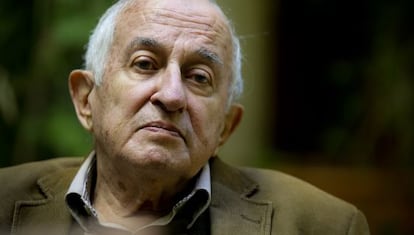Juan Goytisolo: “When they give me a prize I’m always suspicious of myself”
Marrakech-based author of ‘Marks of Identity’ named 2014 Cervantes Prize winner


“When they give me a prize I’m always suspicious of myself. When they dub me a persona non grata I know I’m right,” novelist, essayist and poet Juan Goytisolo told EL PAÍS in his home in Marrakech on Sunday.
He was referring to the National Literature Prize he was awarded in 2008 and the ups and downs of his relationship with Spain’s Almería province – “First they declared me a persona non grata [for my 1954 work] Campos de Níjar, then they declared me a favorite son out of gratitude; and then a persona non grata again for taking the side of the immigrants [who work] in El Ejido.”
But on Monday the 83-year-old author of works such as Count Julian (1970), Juan the Landless (1975) and Makbara (1980) was given a new reason to be suspicious when he was named the recipient of the 2014 Cervantes Prize, which Spain’s Culture Ministry gives out each year to recognize the life’s work of a Spanish-language writer. The €125,000 award, which will be handed out at a ceremony at Alcalá de Henares University next April 23, is considered the most prestigious prize in Spanish literature and previous recipients include Jorge Luis Borges, Octavio Paz and Mario Vargas Llosa.
Born in Barcelona in 1931, Goytisolo published his first novel, Juegos de manos, in 1954 before moving to Paris in 1956 and later to Marrakech. He has worked as a teacher in the United States and a reporter in Sarajevo, Chechnya, Turkey and Algeria, but has never felt the urge to return to Spain. “As much as in Paris as when I taught classes in New York, I have got used to living in a mixed society,” he explains. “When I got back to Spain in ’76 there were only Spaniards, and I thought it was awful. At that time there were no immigrants, and seeing such a homogenous society disappointed me.”
When I got back to Spain in ’76 there were only Spaniards, and I thought it was awful”
The author of a celebrated body of work in the 1950s critical realist vein, Goytisolo broke with his own past in 1966 with Marks of Identity, which was published in Mexico after being banned by the Franco regime. That experimental baptism of fire was, he says, a critique of western myths of Spanish spiritual reserve. But what would the Spanish myths of today be? “Brand Spain,” he replies without hesitation. “Reducing Spain to Brand Spain and not seeing the crude reality of a society that is suffering because of unemployment and marginalization. This myth of Brand Spain has to be undone. If I were a cartoonist, I would draw an unemployed person sat on the sidewalk begging for food and someone coming up to tell him that the Standard & Poor’s agency has just upgraded Spain’s rating from A+ to A++. That is what they are selling us.”
Tu suscripción se está usando en otro dispositivo
¿Quieres añadir otro usuario a tu suscripción?
Si continúas leyendo en este dispositivo, no se podrá leer en el otro.
FlechaTu suscripción se está usando en otro dispositivo y solo puedes acceder a EL PAÍS desde un dispositivo a la vez.
Si quieres compartir tu cuenta, cambia tu suscripción a la modalidad Premium, así podrás añadir otro usuario. Cada uno accederá con su propia cuenta de email, lo que os permitirá personalizar vuestra experiencia en EL PAÍS.
¿Tienes una suscripción de empresa? Accede aquí para contratar más cuentas.
En el caso de no saber quién está usando tu cuenta, te recomendamos cambiar tu contraseña aquí.
Si decides continuar compartiendo tu cuenta, este mensaje se mostrará en tu dispositivo y en el de la otra persona que está usando tu cuenta de forma indefinida, afectando a tu experiencia de lectura. Puedes consultar aquí los términos y condiciones de la suscripción digital.








































